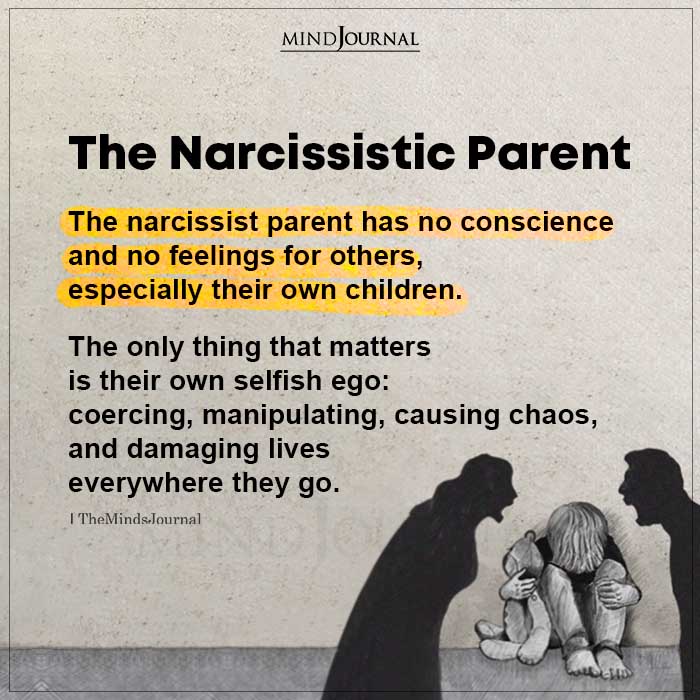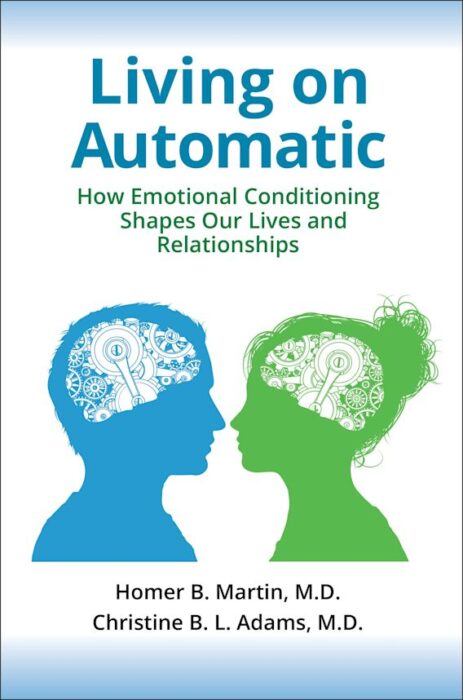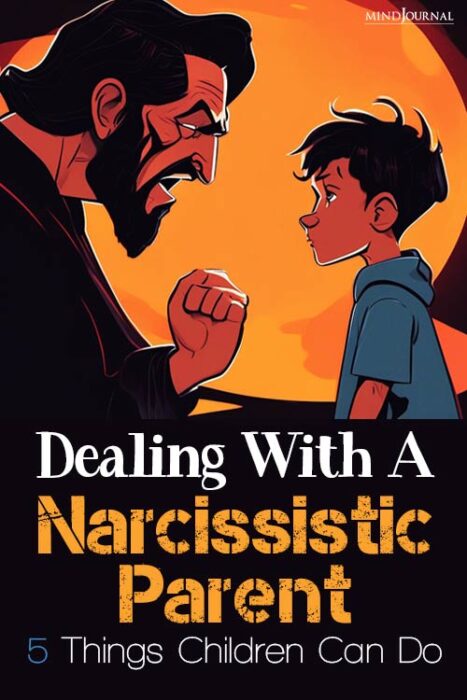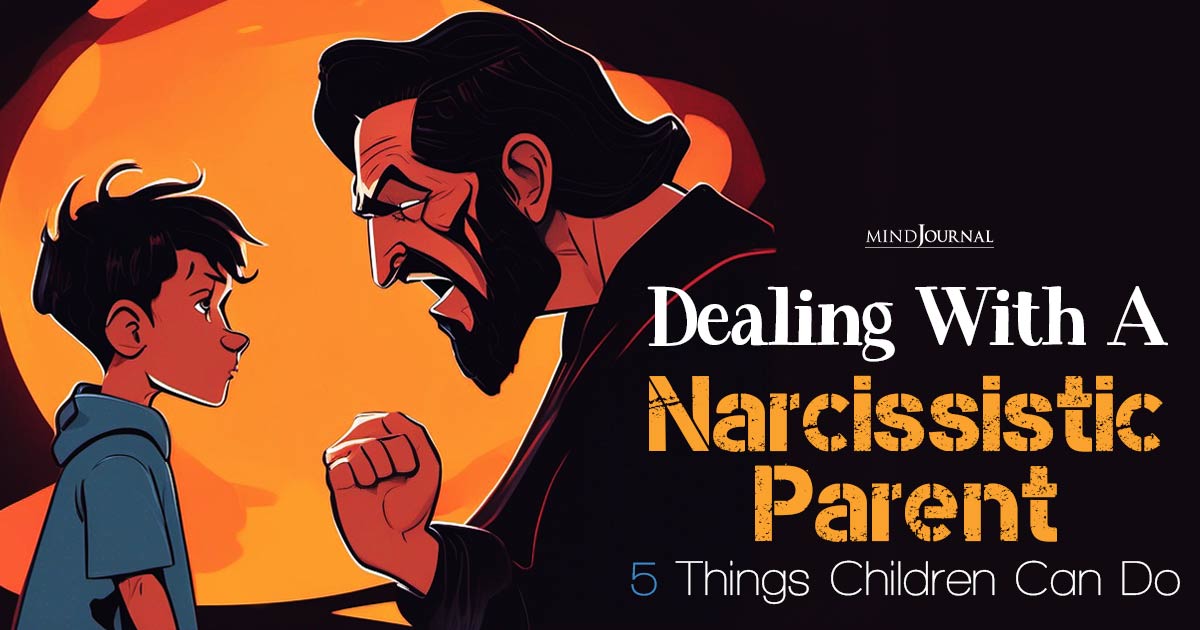How to deal with a narcissistic parent? Communicating with a narcissistic parent or living with a narcissistic parent is without a doubt, one of the hardest and emotionally draining things a person can do, and even more so, when it’s their child. This post is going to talk about what it entails when it comes to dealing with a narcissistic parent.
KEY POINTS
- Non-narcissistic parents can take specific steps to help children attain emotional health and coping skills.
- Goals are to decrease role-reversal, increase assertiveness, and decrease enmeshment.
- A new coping skill includes shifting children’s focus onto themselves and away from the self-centered parent.
- Another coping skill involves recognizing that there are two people in the relationship between self-absorbed parent and child.
In many families, children spend time with a narcissistic parent. This true whether parents are married, never married or divorced. Self-focused parents create certain difficulties for their children—boundary violations, role-reversal, enmeshment, lack of acknowledgment of feelings/emotions, being ignored, and impediments to individuation.
The difficulties can create feelings of low self-worth, guilt, shame, depression, anxiety, poor sense of agency, and lead to self-destructive behaviours (Maatta et al).
Much literature focuses on how to help young adults deal with their narcissistic parents once they are grown (Covert, 2020, Foster, 2019, Hart, 2019, & Overt, 2019). But, what about ways to help young children still living with narcissistic parents?
Related: Co-Parenting With a Narcissist: The Impossible Dream
Goals of Better Helping Children Cope
Parents who are not self-focused seek to help children grow in developmentally healthy ways. They also want their children to have good self-esteem and confidence and the ability to share feelings and voice opinions (Jabeen et al, 2021 & Brummelman & Sedikides, 2020).
The core pathology of narcissistic people is an over-involvement with their own wants and needs. This means they exclude their children from consideration as important and separate people. Instead, they become enmeshed and emotionally rely on their children for emotional nurturance, as if the children were there to parent them.
Here are three goals to help children better deal with self-absorbed parents:
- One goal is to lessen the role reversal. This unburdens children from feeling they must care for and emotionally nurture parents.
- A second goal is to increase children’s sense of being an individual and decrease enmeshment with a self-focused parent.
- A third goal is to create experiences with another type of parenting—from an empathetic parent who acknowledges their children’s individuality and right to their own feelings and opinions.

How Non-Self-Focused Parents May Help Their Child
Since narcissistic parents often marry and divorce non-self-absorbed mates, it is the non-self-absorbed parents who can best help their children discover how to cope and grow emotionally (Martin & Adams, 2018).
In talks with your children, allow to unfold your children’s observations and feelings about their self-centred parent. Do not grill them. Don’t refute or correct. Instead, listen and accept their feelings and thoughts about what it all means to them. Help them label the behaviours of the self-centred parent that aggrieve them. Help them name their emotional reactions to this parent.
Ask children to think of solutions they propose for dealing with their narcissistic parent. Then try role-playing different scenarios with them.
You may need professional mental health help for yourself and your child as you do this. Do not be afraid to seek it out. And, do not allow any bullying or abuse of your child by the narcissistic parent. Take appropriate steps to report any such instances to legal authorities and to get help intervening if it occurs.
Dealing With A Narcissistic Parent: 5 Steps to Improved Emotional Health for Your Child
To attain the identified goals, here are five suggestions that may decrease enmeshment, increase your child’s sense of control of her/his life, increase self-confidence and esteem, and provide new coping skills for interactions with the narcissistic parent.
Step One
Empathic parents must practice what they preach. They need to practice in their own routines what they suggest to their children. They must demonstrate how to secure their own boundaries and how not to be manipulated by the self-absorbed parent.
Related: 18 Signs Of A Narcissistic Co-Parent and How To Deal
Step Two
To remove the selfish parent from your child’s spotlight, remind your child that the narcissistic parent is fully able to take care of himself/herself.
Saying something like, “He (or she) took care of himself long before you were born and he can do it now,” helps your child feel less responsible for the selfish parent’s welfare. Again, the non-narcissistic parent needs to behave in a way that demonstrates demonstrates the appropriate behaviour—no catering or giving in to the self-absorbed parent.
Step Three
Help your child increase the focus on himself/herself. “What should a seven-year-old (or ten-year-old or thirteen-year-old) be thinking about and doing at your age?” is a question to ask that will draw your child back to a focus on him or her in the here and now.
Shouldn’t a seven-year-old be focused on school, friends and play activities? Shouldn’t a ten-year-old also be involved in sleepovers, movies, reading, outdoor games? Shouldn’t a fifteen-year-old be interested in the opposite sex, in shopping, extracurricular activities, sports, music, as well as academics?

Step Four
Discuss with your child the importance of recognizing there are two people in every relationship. One person does not get all the air time and does not get to dictate how the other person feels and acts.
Children do have a right to make their views and feelings known, even if the self-centred parent does not want to listen or acknowledge their views. Again, the non-narcissistic parent must model the how-to behaviour, since children learn what they see demonstrated more than what they are told.
Help your children express their thoughts, opinions, and feelings to their self-absorbed parent by discovering how to say something like:
“You’re not the boss of what I think or feel.”
“Here’s what I think or how I react to what you say/do/ tell me to do.”
Related: 6 Kinds of Emotional Abuse by Narcissistic Parents
Step Five
For children unhappy with and struggling with joint custody when parents are divorced, I add another step. This is for children spending around fifty percent or more time with a self-focused parent and who want to spend less time with that parent.
I suggest urging them to speak up and make their desires known to that parent. This is the direct opposite of what narcissistic people want. They do not want to hear other’s ideas. They want to be the boss of everyone.
Discovering how to say something like, “I want to spend more time with Dad (or Mom). Please let me,” will grow your children’s sense of agency, of asking for what they need, and of believing they are equally important in the relationship.
These five steps are aimed at giving children with narcissistic parents the agency they need and the resilience to become whole and confident, even when faced with the adversity of a self-focused parent who wants to tune them out, berate them, or manipulate them.
Check out her website to see more blogs, podcasts and articles. Also, don’t forget to check out her amazing book, Living on Automatic: How Emotional Conditioning Shapes Our Lives and Relationships.

References:
Brown, N. (2021) Children of the Self-Absorbed, New Harbinger, Oakland, CA. Brummelman, E., Sedikides, C. (2020), Raising children with high self-esteem (but not narcissism), Child Development Perspectives, 14(2): 83-89. Covert, T.J. (2020) Narcissistic Fathers: The Problem with Being the Son or Daughter of a Narcissistic Parent and How to Fix It, Independently Published, 15 March, 2020. Foster, C. (2019) Narcissistic Parents. The Complete Guide for Adult Children, Independently Published, 27 September, 2019. Hart, A. (2019) Narcissistic Fathers, Independently Published, 27 February, 2019. Jabeen, F. et al. (2021) Healing the next generation: An adaptive agent model for the effects of parental narcissism, Brain Informatics, 8(1):1-20. Maatta, M. et al (2020): “She does not control me anymore but I can hear her voice sometimes”– –a phenomenographic research on the resilience perceptions of children who have survived from upbringing by a narcissistic parent, European J. of Education Studies, (6) 12. Martin, H.B. & Adams, C.B.L. (2018) Living on Automatic: How Emotional Conditioning Shapes Our Lives and Relationships, Praeger, Santa Barbara, CA. Overt, C. (2019) Narcissistic Mothers and Grown Up Daughters: The Hell of Narcissistic Family, Kindle, 15 December, 2019.
Written By Christine B. L. Adams M.D. Originally Appeared On Psychology Today















Leave a Reply
You must be logged in to post a comment.